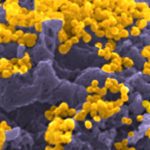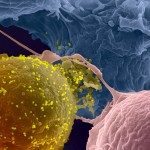Lien vers Pubmed [PMID] – 34418431
Lien DOI – S0021-9258(21)00901-710.1016/j.jbc.2021.101098
J Biol Chem 2021 10; 297(4): 101098
The progressive loss of CD4+ T cells during HIV infection of lymphoid tissues involves both the apoptotic death of activated and productively infected CD4 T cells and the pyroptotic death of large numbers of resting and abortively infected bystander CD4 T cells. HIV spreads both through cellular release of virions and cell-to-cell transmission involving the formation of virological synapses. Cell-to-cell transmission results in high-level transfer of large quantities of virions to the target cell exceeding that achieved with cell-free virions. Broadly neutralizing anti-HIV antibodies (bNAbs) binding to HIV envelope protein capably block cell-free virus spread, and when added at higher concentrations can also interdict cell-to-cell transmission. Exploiting these distinct dose-response differences, we now show that four different bNAbs block the pyroptotic death of bystander cells, but only when added at concentrations sufficient to block cell-to-cell transmission. These findings further support the conclusion that HIV killing of abortively infected bystander CD4 T cells requires cell-to-cell transfer of virions. As bNAbs attract more interest as potential therapeutics, it will be important to consider the higher concentrations of these antibodies required to block the inflammatory death of bystander CD4 T cells.



